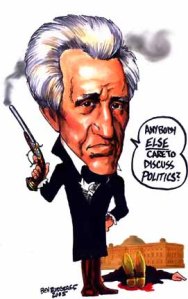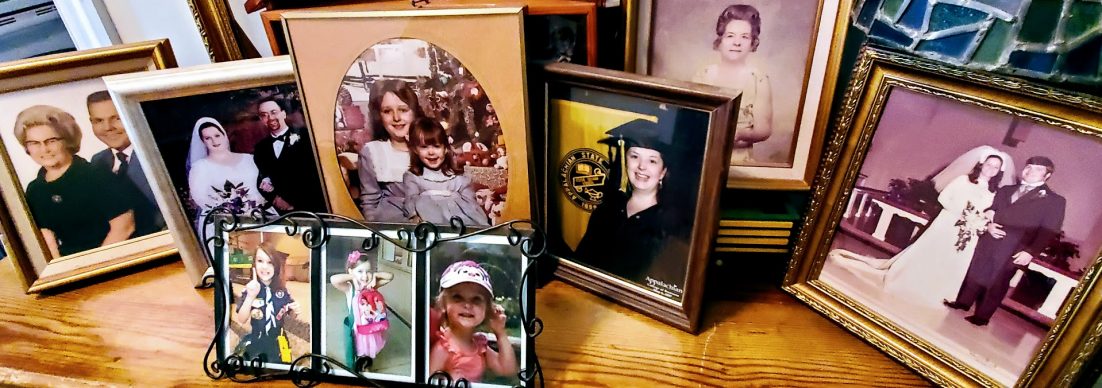
source: commons, wikimedia.org Andrew Jackson
I always knew I was kin to Andrew Jackson; it’s something my father was very proud of, since it was through his mother’s family. My mother, on the other hand, a dyed-in-the-wool Democrat, always hedged her words carefully, indicating that he might not be the relative of whom we’d be most proud! Now I know why she’d say that. I believe politically, I’d agree with this President’s policies, but personally, I kind of doubt we’d like each other. He was known to have a temper, to even be violently explosive at times! Gracious! How could someone like that become President?
Well, he was a war hero, active in politics for years, and truly, the first “populist” President. He and his supporters formed the Democratic Party! He was the first President not born in wealth, the one the people could identify with, and him with them! Let me start at the beginning, for a brief synopsis of his interesting life.

source: galleryhip.com
Andrew Jackson was born on my birthday, March 15, but over 180 years earlier, in 1767. Tragically his father died in an accident just before Andrew was born. Andrew’s father was also Andrew–Andrew Bennett Jackson and his mother was Elizabeth Hutchinson. The parents had emigrated from Ireland, but were of Scots-Irish descent and devout Presbyterians. Andrew’s older brothers, Hugh, age 2, and Robert, age 3, came to America in 1765 with their parents. Andrew was born in what is now Waxhaw, South Carolina, but both Carolinas claim him, as his birthplace was only about 18 miles south of Charlotte, NC., right on the line between North and South Carolina! At the young age of 13, Andrew acted as a courier during the Revolutionary War, as did his brother Robert. Andrew’s oldest brother Hugh fought and died in the War. The younger boys were captured by the British, imprisoned, and made to serve as servants to the British officers. One story states that Andrew was ordered to polish an officer’s boots, and when he refused, he was slashed with a sword, forever scarred on his hand and head! By the time their mother secured their release, Robert and Andrew had come down with smallpox, and Robert soon died! By the end of the year of 1781, Elizabeth died also, of cholera, which she contracted as she nursed American soldiers with that disease. So, the Jackson family came to America pursuing religious freedom, and economic stability, and within years, all were deceased except Andrew, who became our 7th President! Some people crumble under such adversity, some are honed by fire, I would have to say, Andrew succeeded brilliantly but with a sad and very rough beginning.
As he matured, Andrew taught school, and eventually became a lawyer through his education in Salisbury, NC. He then moved to S.W. North Carolina, which is currently part of Tennessee. In fact, Andrew Jackson is credited with helping found the town of Memphis, Tennessee.
His legal work began to earn him a stellar reputation in Tennessee, and among other honors, he was elected to the Continental Congress of 1796. It appears that his highly respected leadership in the War of 1812 propelled him to National fame. He was known as the person who led the troops that saved New Orleans. Then even though he defied the orders of his superiors, he went to Florida, fought and conquered the Spanish and the Seminoles, and won Florida for America! That earned him significant fame and recognition.

source: proactvoice.wordpress.com, Clear and Present danger: The Corporation is Systematically Sucking the Lifeblood Out of America
In 1824, he ran for President against John Quincy Adams. All together, there were four candidates, and no one got enough votes to win. The House of Representatives appointed John Q. Adams as President, and Andrew Jackson was furious, feeling like the voices of the people had not been heard. At that point he vowed to rid the country of the electoral college, a sentiment I’ve shared a time or two!

Andrew Jackson was elected President of the People; the first of the Democratic party, in 1828. He was the first President to open the White House to the public. He investigated the administrators of Government controlled agencies like the postal service among others. It did not make him popular among the insiders, who thought their positions and power were secure. Jackson even called the Second National Bank a monopoly, and vetoed a bill passed by congress extending their charter for another four years. He diverted the money to banks in the States. The people loved him, and readily reelected him in 1832. The other politicians didn’t like him half as much, accusing him of being rude and manipulative. On January 30, 1835, a man named Richard Lawrence attempted to assassinate Andrew Jackson, but his gun misfired! This was the first attempt to kill a sitting President in our country. Lawrence was an out of work house painter. He said he blamed Andrew Jackson, for his loss of work, due to his dealings with the bank, and that only if Andrew Jackson died would money flow again!
-

-
source: pinterest.com
-

-
source: pinterest.com
When Andrew Jackson retired from his Presidency, he retired to his Presidential home in Nashville,Tennessee, named “The Hermitage”. Today the home is a beautifully restored piece of history we are told, and I for one would like to visit there. Although it tends to rank third behind Mount Vernon and Monticello for numbers of visitors, it is considered just as significant and beautiful as the others.
Just as Andrew Jackson’s personhood and Presidential practices were controversial, so are his genealogical ancestry records. For years, most experts named our 6th great-grandfather, Dr. Joseph Jackson, 1690- 1765 in Londonderry,Ireland, as the grandfather of our President. His father Andrew Bennett Jackson, 1737 is not in question. However, many more recent genealogists have made the case for one Hugh Jackson and his wife Elizabeth Creath as the grandparents of President Andrew Jackson. The Andrew Jackson Foundation which maintains Hermitage presents both lines of ancestors and states that the proof is still not conclusive to either line. In the second line, Andrew remains our 1st cousin, because the second ancestral line only changes the father of our grandfather David, not the brotherhood of him and Andrew Bennett. This family was surely well-connected, because earlier I wrote a blog post about David Jackson, my fifth great-grandfather, Uncle to the President (his father’s brother) who fought in the Revolutionary War with President George Washington, also a cousin of mine.(see this blog post) From http://www.eupedia.com/forum/threads/30167-President-Andrew-Jackson-belonged-to-haplogroup-I1, “Andrew Jackson (1767-1845), the seventh President of the United States, most probably belonged to haplogroup I1 based on results from the Jackson DNA Project. His genealogy shows that he is descended from Richard Jackson (1505-1562) from Killingsworth, Eske, Yorkshire, England. Several members (e.g. 93323, 188015, 222633) of this lineage have been tested and they all belong to I1-M253.” Our Hogue family who married into the Jackson family is also in Haplogroup 11, how interesting!
-

-
Hermitage, source travelthruhistory.tv
-

-
home of Andrew Jackson from fioreinteriors.blogspot
-

-
nps.com
Andrew (7th Pres.) Jackson (1767 – 1845)
is your 1st cousin 6x removed
Andrew Bennett Jackson (1737 – 1767)
father of Andrew (7th Pres.) Jackson
DR JOSEPH JACKSON (1690 – 1765)
father of Andrew Bennett Jackson
David Jackson (1730 – 1811)
son of DR JOSEPH JACKSON
Mary Jackson (1754 – 1800)
daughter of David Jackson
Hugh (twin) Hogue (1788 – 1880)
son of Mary Jackson
Hugh Jackson Hogue (1825 – 1870)
son of Hugh (twin) Hogue
Robert Fulton Hogue Sr. (1850 – 1924)
son of Hugh Jackson Hogue
Helen Blanche Hogue (1881 – 1964)
daughter of Robert Fulton Hogue Sr.
Cecil Hogue Youngblood (1910 – 1988)
son of Helen Blanche Hogue
Helen Spear Youngblood Holshouser
You are the daughter of Cecil Hogue Youngblood

This gallery contains 12 photos














